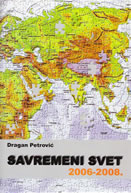| NSPM in English | |||
The Economic Crisis Ends; the Political Crisis Begins |
 |
 |
 |
| уторак, 29. децембар 2009. | |
|
(Global Research, December 24, 2009)
The European corporate-elite — like their American counterparts — lavished non-stop praise on the “bold yet necessary” decision to bail out the banks; the economy was supposedly saved from “impending collapse.” But every action has an equal but opposite reaction. Bailing out the banks saved the butts of dozens of European bankers, but now millions of workers are about to experience a thundering kick in the ass. Unbeknownst to most Europeans, the public money that financed the bank bailouts created a massive public debt problem, to be solved by massively slashing public programs that benefit workers and the poor. This amounts to a blatant transfer of billions — maybe trillions of dollars — in public wealth, away from the majority of citizens toward a parasitic crust of bankers. These “tough decisions” should act as warnings to the American working class, since the U.S. corporate-elite, too, has clear-cut plans for who is to pay for their colossal spending spree on bank giveaways and foreign wars (hint: it’s not them). The massive amounts of government bonds printed to pay for the global bank bailouts were purchased by global investors (capitalists). For these vultures, government bonds are an excellent investment when the economy crashes, and gambling on stocks turns sour. Now, these investors want to be sure that the heavily indebted governments are able to pay up. And they’re becoming impatient. A good peek into the mind of the global investor can be seen in any of the three global “credit ratings agencies” — Moody’s, Standard and Poor’s, and Fitch. These corporations give “grades” to debtors — federal governments, corporations, state and city governments, etc. — based on their “credit worthiness.” To have one’s grade lowered means that investors should back off and demand higher interest rates on loans, if loans are made at all. Receiving a “B” instead of an “A” can make the difference between a poor nation being able to build a highway, hospital, or school. Recently, Moody’s released their notorious “misery index” — the nations that are most sunken in debt and least able to pay it back, requiring that “special measures” be taken to prove to investors that these governments are able to repay their loans. The biggest losers of the misery index were not surprises and included the above-mentioned European countries. However, ranking right behind bankrupt Iceland was the United States: the once-proud super-power is now a debt-ridden carcass, with investor vultures circling overhead. Moody’s is warning rich investors to be wary of formerly rich countries defaulting on their loans, i.e., going bankrupt. Moody’s chief of rating nations’ credit, Pierre Cailleteau, explains why: "This is mainly because of the crisis of public finances [bank bailouts plus unemployment] that has beset many rich countries in what Moody's believes will be the final — and disturbingly long-lasting — stage of the crisis.” This is what passes for optimism nowadays. Moody’s is demanding that less-rich nations like Greece, Ireland, Spain, etc., take immediate actions to make their rich investors happy. The Washington Post explains Ireland’s situation: “More than $4 billion in cuts…will slash salaries for 400,000 government workers while making painful reductions in benefits for such groups as widows and single mothers to the blind and disabled children.” Unemployment benefits were also slashed by as much as 30%.” (December 22, 2009). The U.S. and the U.K. need not make immediate cuts, but they must make immediate plans to make major cuts, explains Moody’s spokesmen Cailleteau: “…this will be the year [2010] where both the U.S. government and the U.K. government will have to articulate a credible plan to address their problems of large debt.” John Chambers of Standard & Poor’s was more blunt: "The U.S. government, like the U.K. government, the Greeks and the Irish, is going to need to draw down fiscal stimulus, pare expenditures [make cuts], raise revenues [taxes] and probably take a look at [cuts] in their entitlement programs" — Social Security, Medicare, Education, etc. This is not news to President Obama. While he was extending the Bush bank bailouts, Obama took time to calm the nerves of investors, who saw an exploding debt that would soon need to be dealt with. That is why Obama pledged to the Washington Post that he would "reform entitlement programs.” (January 16, 2009). This was to be done after the economy had stabilized. It's almost time. The mainstream media will surely go on the offensive to support our corporate-owned President in his assault on the social programs long cherished by the American working class. We will be told that there are “no other options,” when in fact there are. Not only could military spending be reduced by hundreds of billions of dollars per year, but taxes should be raised significantly for the very wealthy. If the top 1 percent of the richest Americans were taxed at 90 percent, hundreds of millions of Americans would benefit, since public education would be saved, alongside Medicare and Social Security. Barack Obama will soon be pursuing a policy that George Bush Jr. would never dare try. He must be resisted at every step. American unions should look to Europe for inspiration for how to deal with the coming onslaught: mass demonstrations and united strike action will be the only way to put sufficient pressure on a government enforcing a solidly right-wing corporate agenda. The political instability that is currently engulfing Europe is soon to be exported to the United States — we must not be caught off-guard. The issue of the day is clear: somebody must be made to pay for the economic crisis. The corporate-elite is planning to push this burden on to the working class. The working class must push back. Unions and community organizations should begin organizing now in anticipation, with demands to tax the rich and corporations, and to save Social Security, Medicare, and public education. Shamus Cooke is a social service worker, trade unionist, and writer for Workers Action (www.workerscompass.org). |
Остали чланци у рубрици
- Playing With Fire in Ukraine
- Kosovo as a res extra commercium and the alchemy of colonization
- The Balkans XX years after NATO aggression: the case of the Republic of Srpska – past, present and future
- Из архиве - Remarks Before the Foreign Affairs Committee of the European Parliament
- Dysfunction in the Balkans - Can the Post-Yugoslav Settlement Survive?
- Serbia’s latest would-be savior is a modernizer, a strongman - or both
- Why the Ukraine Crisis Is the West’s Fault
- The Ghosts of World War I Circle over Ukraine
- Nato's action plan in Ukraine is right out of Dr Strangelove
- Why Yanukovych Said No to Europe

.jpg)








 First Iceland, then Ireland, now Greece. Much of Europe is mired in inescapable debt and bankrupt nations, the result of crashing banks, bank bailouts, and soaring unemployment. The U.S. and U.K. watch from a distance, knowing their turn is next.
First Iceland, then Ireland, now Greece. Much of Europe is mired in inescapable debt and bankrupt nations, the result of crashing banks, bank bailouts, and soaring unemployment. The U.S. and U.K. watch from a distance, knowing their turn is next.













